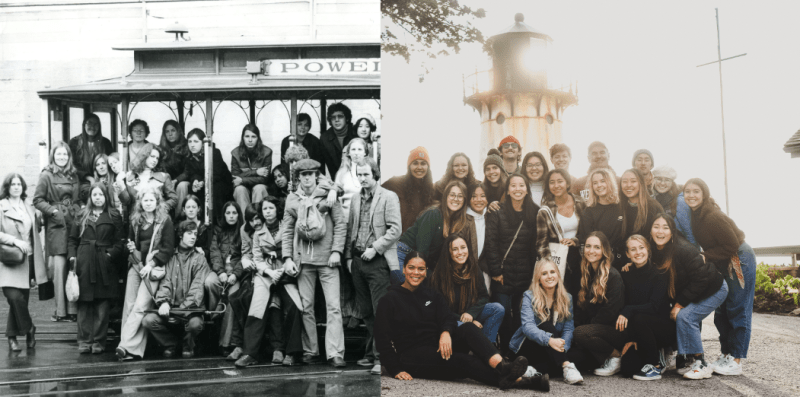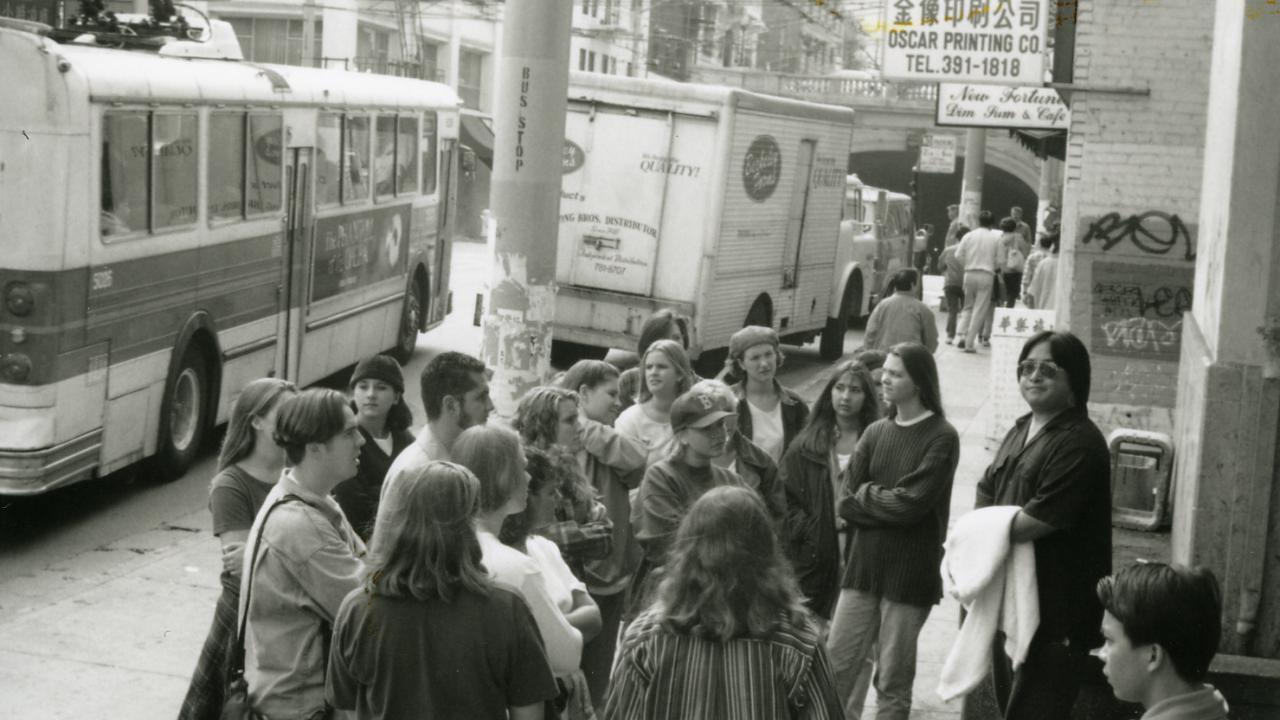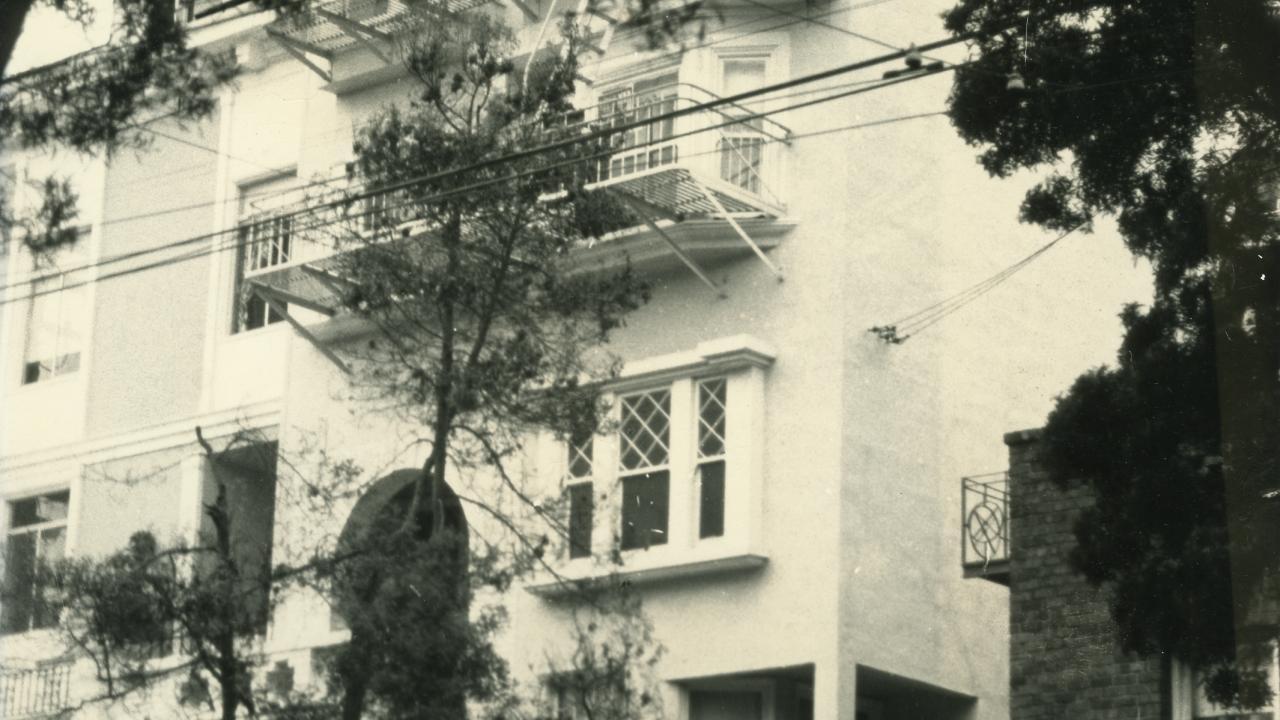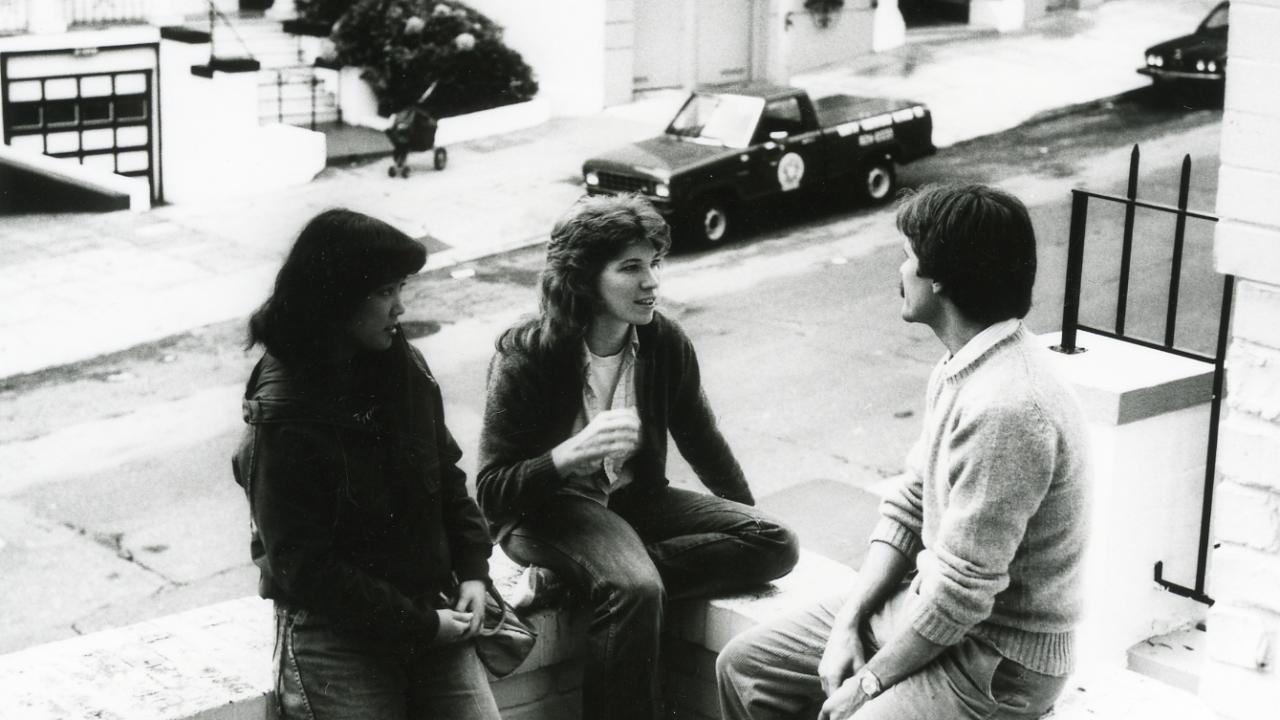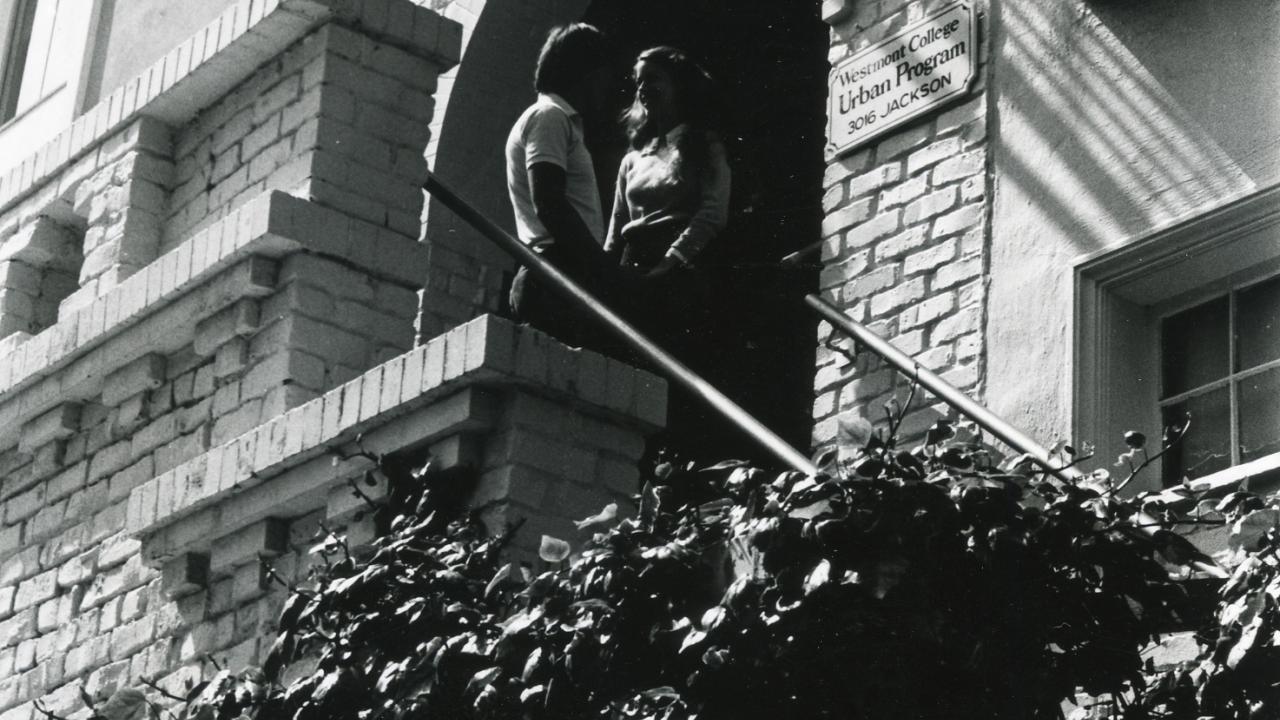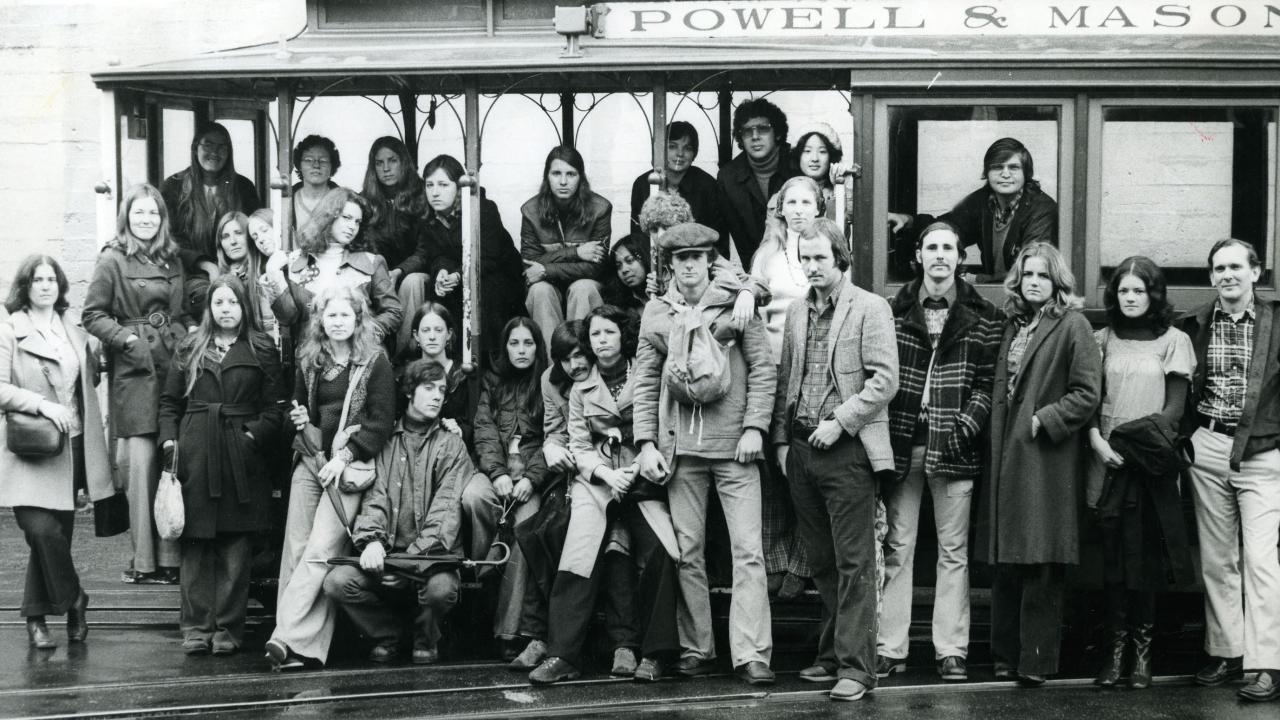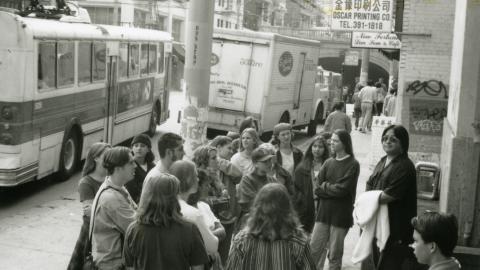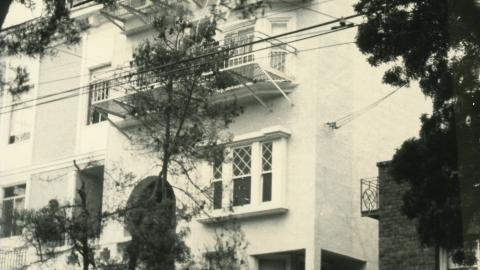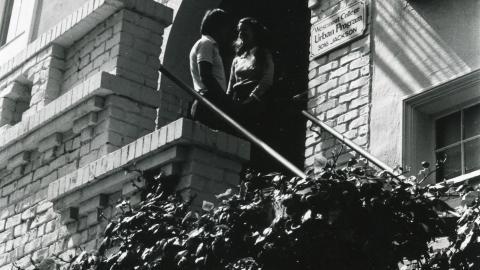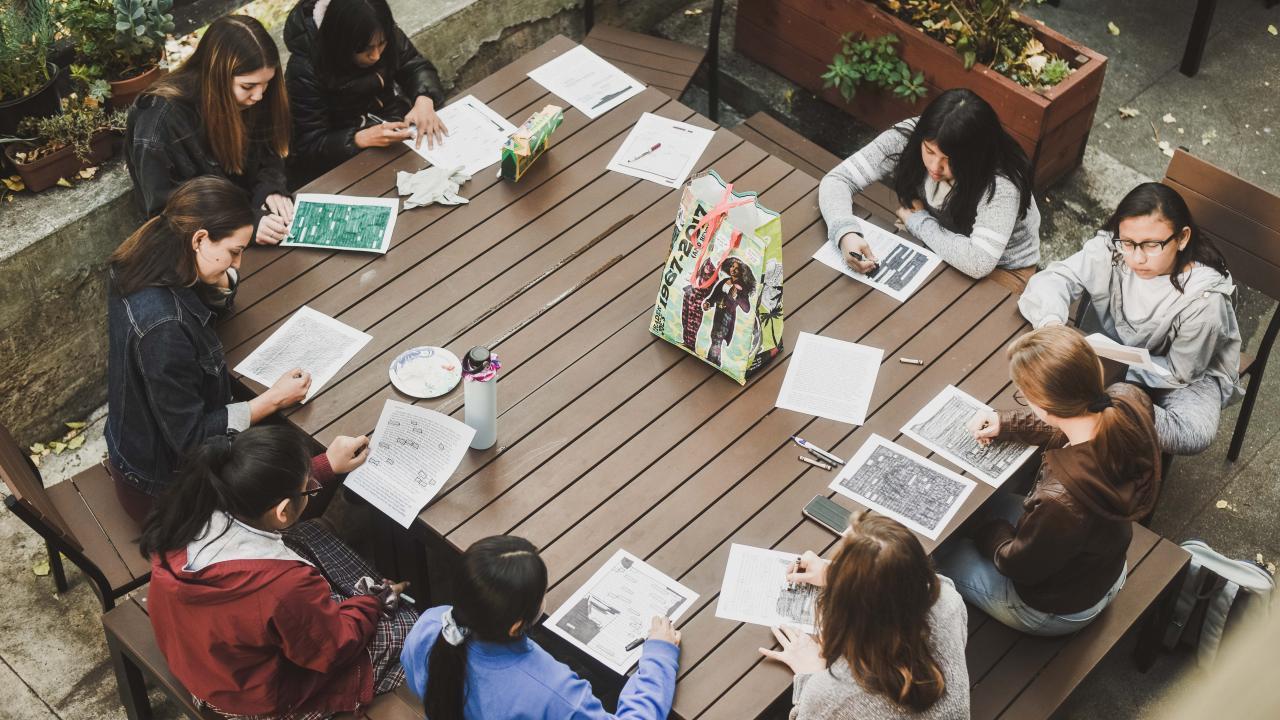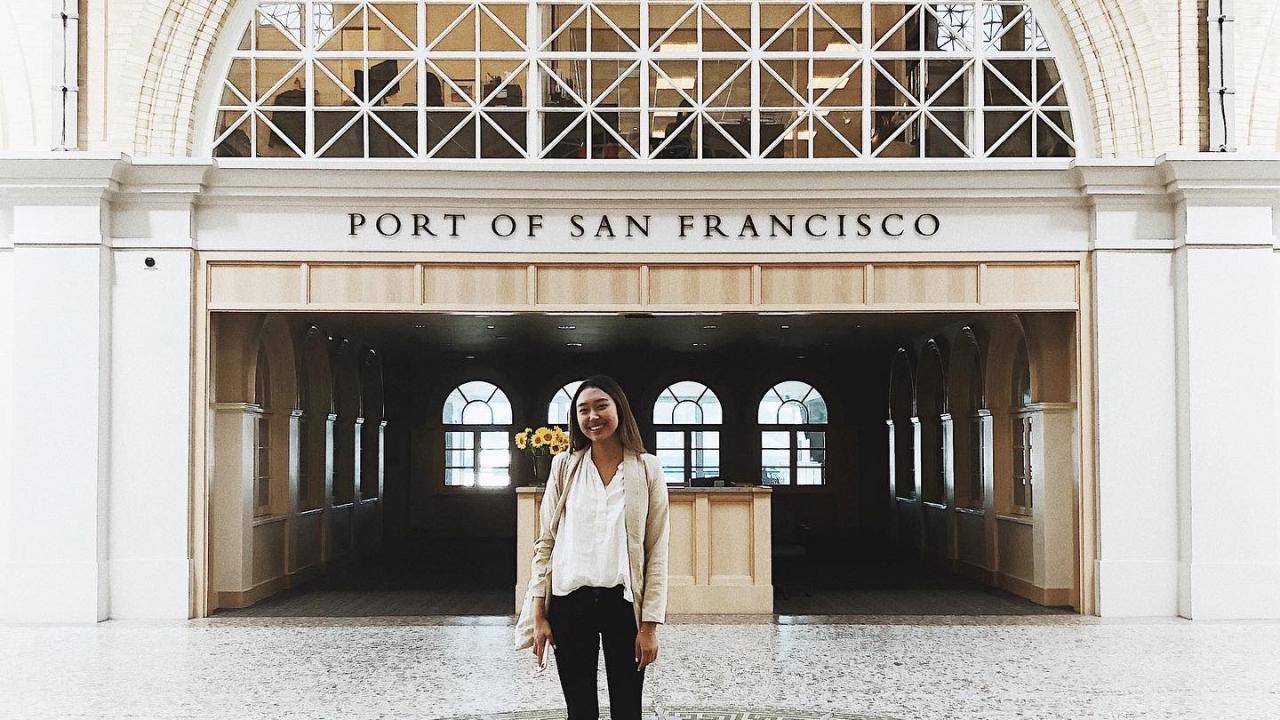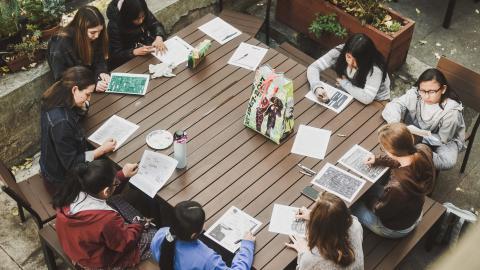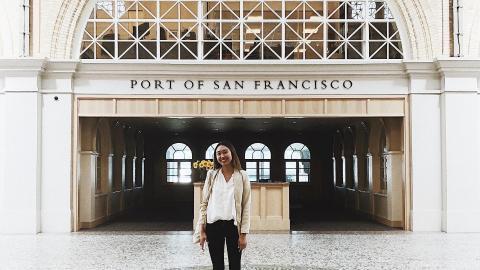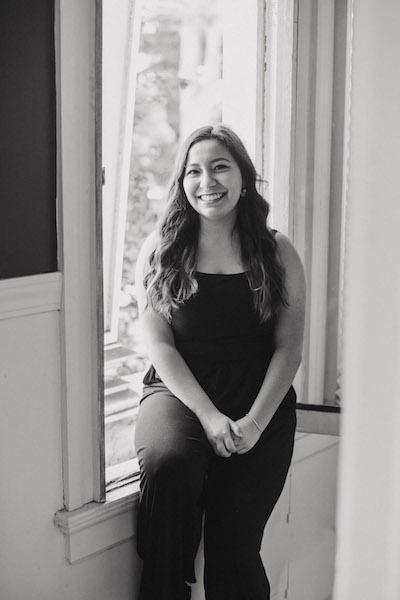Westmont Magazine A 50-Year Urban Adventure
Westmont's Bridge to San Francisco
Two sociology professors sought a dynamic way to explore urban problems with their Westmont students in the late 1960s. For three years, Brendan Furnish and Ron Enroth dedicated 10 days of their Christmas break to taking 20 students to San Francisco. They toured the inner city and worked with local social service agencies to encounter and learn about the challenges facing urban areas and their marginalized residents. Furnish, who came from the Bay Area, had studied urban issues, and Enroth wanted to introduce his students to the sociological practice of participatory observation.
Enroth later recalled that they asked each other, “What if we could somehow come up with an Urban Semester, where these students would experience some of these things and have employment or placement in internships?” The San Francisco Urban Internship Program (now Westmont in San Francisco, WSF) began with a pilot program in spring 1971, and the semester launched officially in fall 1972. Working closely with Furnish and Enroth, Robin Wainwright ’64 and Ron Fagan ’70 directed the inaugural program, based at Lone Mountain College, with 31 Westmont students and two Wheaton students.
While the semester grew out of the sociology department, it soon expanded to include students from all majors. In November 1972, Wainwright wrote a letter explaining the new initiative after a letter to the editor in the Horizon questioned its validity at a liberal arts college. “The urban environment serves as the laboratory for some foundational inquiry into a potentially wide range of subjects and problems about which we may already possess some theoretical knowledge,” Wainwright wrote. “The setting thus provides the opportunity to pursue further knowledge in a particular field of study through the use of new methods and resources. Hopefully, it also provides the opportunity to make new personal discoveries . . . We see the Urban Internship Program as being in full keeping with the best intentions of the liberal arts curriculum at Westmont. We see it as both an extension of the learning process and a stimulation to that process.”
After a visit to San Francisco, psychology professor Craig Ellison submitted a report about the fledgling semester in September 1972. He noted that students traveled to sites to select their internships and attended sessions on the city’s history and the church’s historical involvement.
Before taking field trips to mental health and aging agencies, they watched films on aging and mental health in the inner-city. In the coming weeks, they’d hear talks about welfare rights and Haight-Ashbury. Ellison mentioned the goals of creating an interdisciplinary program and recruiting students from other Christian colleges.
“There is a high level of excitement about learning among the students,” he said. “The program staff has worked creatively for long hours. There seems to be a general sense of togetherness and anticipation. I was excited by what I saw and heard.”
In 1976, Rose Marie (Rusty) Springer left her position as dean of women at Westmont to become associate director of the Urban Program. Her responsibilities included administrative work, counseling and supervising internships and teaching a related class. “My move to the city opened the door to what I consider to be a new work of God’s grace in my life: the opportunity to understand and experience the world in a way that would never have happened if I had remained in Santa Barbara,” she said.
“Living and working in the city brought me face to face in a concrete way with some of the pain of the poor and marginalized and with some of the issues prevalent in an urban setting—issues that are duplicated in many other cities and countries in the world. As a result, I found that I began to look at my life and my responsibility to God in completely new ways.
“The Urban Program also offered the privilege of working closely with a small group of students and being part of their intellectual and spiritual development. It was an extraordinary experience to witness the growth they made each semester and to see their beautiful openness to the challenges before them as they immersed themselves in the study of the city and its people.
“I’m very glad Westmont has adopted the policy of encouraging students to do off-campus programs because of what it does for students to apply their faith in a different place—how it challenges them, what they learn from it and how useful it is for their own growth.”
Springer retired in 1997 but keeps in close touch with the WSF faculty. An endowed scholarship fund which bears her name and honors her legacy assists students enrolled in the semester. “Rusty has been such a force in the development of the program,” says Brad Berky, assistant professor of urban studies and director of WSF.
Steve Schultz directed the Urban Program for 20 years, from 1982 until 2002, preserving the original vision: providing students with the opportunity to engage the city and its people and better understand God’s calling. “That call takes shape through day-to-day encounters on the street, the diverse responsibilities of an internship, lectures and discussions that explore difficult social issues, faculty who take the time to know students on a deep, personal level and late-night conversations with fellow participants,” he said. “The opportunity to encounter people in profoundly different circumstances gives students a sense of their common humanity that affects the rest of their education.”
The Urban Program moved to a rooming house on Jackson Street in Pacific Heights in the early 1980s and remained there until Westmont purchased the Clunie House, a restored Victorian mansion, in 2002. A historical landmark, the building once served as a residence and gathering spot for notable musicians such as Jefferson Airplane, Janis Joplin, the Grateful Dead and the Charlatans. Thomas Jefferson Clunie, a lawyer, real estate speculator and politician, built the home in 1897. Originally surrounded by sand dunes, the house now sits squarely in the city, close to Golden Gate Park, Haight-Ashbury, Japantown and Pacific Heights. Given its age, the building has required ongoing maintenance and renovation; the college had to raise it off its foundation and retrofit the structure before moving in. After years of dealing with costly repairs, the college has sold the Clunie House and will relocate to the renovated facility on Jackson Street, leasing space like nearly all other off-campus programs.
In 2012, David and Judy Neunuebel ’69 funded the development of a rooftop garden for the Clunie House. Dan Ribbens ’76 designed it, and Pecos and Katie Pryor ’10 and Curtis Davenport ’10 constructed the garden. “It’s become a big part of our community life,” Berky says. “We’re going to take our garden with us to Jackson Street.”
Berky attended the Urban Program as an undergraduate at Gordon College, and he joined the faculty in 1990. “As we evolve, we keep the best of the program and introduce new classes and new emphases with the internships around vocational formation,” he says. “In fall 2021, we’ll conduct a comprehensive review to provide greater visibility of how the program has evolved and what we currently do.”
Karen Andrews ’83 joined the faculty in San Francisco in 1997. “She played a formative role in the program following Rusty’s retirement,” Berky says. “Her work was defined by a measure of openness, hospitality and winsomeness that was truly unique. I appreciated her depth of genuine care for students and her commitment to helping them find their voices in their writing and conversation.” For 22 years, she taught urban studies, English electives and independent studies tutorials, serving as associate director and associate professor of English. She sought to highlight the voices of those who are silenced and marginalized and to pursue God's truth and beauty through literature and the arts.
From the beginning, internships have served as the program’s signature component. Few colleges offered such learning experiences in the 1970s. Developing relationships with San Francisco agencies, organizations and businesses helped the faculty find high-quality placements that often changed the direction of individual lives. Throughout the decades, Westmont students have gained a reputation for their abilities and character. They’ve been interning with some organizations for more than 30 years: the chaplaincy at San Francisco General Hospital, the Office of the Public Defender (where all the other interns are law students) and St. Anthony’s Foundation, a multiservice agency serving low-income clients. An internship led Mark Jacobs ’83 to the public defender’s office, where he has worked for more than 25 years and welcomed a succession of Westmont interns.
Today, WSF offers practical, tangible experiences in business, the tech sector, social service agencies, the media and non-profit organizations. At Because Justice Matters, an offshoot of YWAM, students work with vulnerable, marginalized women in the sex trade. Media internships include two television stations, KTVU (Fox) and KPIX (CBS) as well as KQED radio. Students have also interned with high-profile organizations such as the San Francisco Giants.
Ryan Zoradi ’08, principal at Patamar Capital, recruits Westmont interns for his international venture capital firm focused on investing in South and Southeast Asia’s mass market. BrightBytes also seeks students to work for the educational technology company that uses data to improve learning. Other internship sites include Adobe and LendingClub, a peer-to-peer lending company based in San Francisco.
Some students choose to work for start-ups rather than corporations or established businesses to benefit from more significant duties and deeper experiences. Economics and business majors now outnumber students from other departments two to one.
WSF has developed a partnership with Westmont’s Center for Applied Technology (CATLab), with three to five of its students doing internships in San Francisco’s tech sector while continuing to work on coding projects for the college.
For the second time this summer, incoming students may register for an optional pre-Orientation program: Urban Adventure. This intensive, 10-day experience helps students learn more about the city and urban issues, engage in service projects, visit sites such as Alcatraz and attend a Giants baseball game. The primary goal: encouraging students to begin developing relationships with their peers.
Three full-time staff members work for the program: Berky; Kristen Leichty, assistant director for marketing and operations; and Sophie Ramirez, residential coordinator. Rather than basing full-time professors in San Francisco, the program now relies more on Westmont faculty who visit the city and teach short, intensive courses on a variety of topics.
For example, Chris Milner, associate professor emerita of kinesiology, offered a session on special populations and took students on site visits. In the fall, theater arts professor John Blondell will discuss ethnic minority playwrights. Former Westmont professor Marilyn McEntyre has taught classes on environmental literature and the literature of plague and pandemics. In summer 2019, economics and business professor Enrico Manlapig led a session on decision analysis (see the related story in this issue). Scheduling classes with Westmont professors from a variety of departments allows WSF to offer a greater range of experiences for students.
Berky teaches the core course, Faith Culture and Diversity, which explores cultural competency, race, class, gender and religion. “The overarching theme is shalom,” he says. “How can we be reconcilers and not dividers? How can we love and serve our neighbors even when we disagree with them?” He brings in guest speakers who represent a variety of viewpoints and backgrounds so they can share their personal experiences.
His goal is helping students develop what he calls “cultural humility.” “Being humble helps us know the limitations of our own perspective,” Berky says. “That’s an essential job skill now. If you can effectively navigate difference and diversity, you can work effectively with diverse people in any sector.”
At the end of the semester, students compile a portfolio of their experiences in classes and placements. They complete a research project focusing on tangible outcomes for an organization, engage in informational interviews, and use skills they developed in the classroom in a different context.
“We’ve done good work to develop a fully fledged liberal arts program with a significant internship,” Berky says. “I don’t believe in a hierarchy of vocation; I think it’s more important to become a thoughtful person of character than to work in a specific industry.”
WSF placements extend beyond typical internships. “We’ve been doing this for 50 years,” Berky says. “Part of vocational preparation is knowing who God is calling us to be. Spiritual formation is an important component of what we do as we help students bring their faith into their vocation and work. Our internship partners value Westmont students because we coach them well, care about the kind of people they’re becoming and provide a substantive, intentional learning experience.”
Since 2017, WSF has offered a summer program that begins after Mayterm and features an eight-unit internship course compressed into 10 weeks. Taking the two programs together provides the equivalent of a regular semester. The summer session returns in 2021 after the pandemic forced its cancellation last year. “Students—especially those in the sciences—have requested this option for years,” Berky says. “It’s popular; this year 47 students applied for 21 spots.”
The current generation of college students gives Berky hope. “They’re hungry for a vision of responding to the world as it is and not as we imagine it to be, a compelling vision of walking with Jesus,” he says. “They want to pursue something that feels like it can change the world—and they have an amazing ability to treat their differences with curiosity rather than judgment. We seek to make WSF a place of deeply rooted faithfulness and critical reflection that helps students develop a spirit of humility and recognize the limits of their knowledge.”
Education Through Encounter
Excerpts from an early promotional story about the Urban Program that Ron Enroth, a Houghton alumnus, wrote for the Houghton Millieu.
In the spring 1971, Westmont College’s sociology department launched a pilot urban studies project in the city of San Francisco that has developed into a full-fledged internship program. Participants receive full academic credit for the program consisting of a minimum of 24 hours per week in field placements and for twice weekly evening seminars in urban studies and an individualized reading program. The emphasis is clearly on field experience to implement the notion that much significant learning is acquired through doing.
Students may select one or more placements from among dozens of agencies and organizations throughout the city. These include social service agencies, legal assistance organizations, minority group programs, public school tutoring, mental health facilities, hospitals, counseling services, community relations units of the police department, senior citizen programs, juvenile court, homes for delinquent girls, community action centers, Head Start, and religious organizations like the Salvation Army.
Encounter with the world outside the classroom begins each morning with a ride on a bus or cable car. Students are required to use public transportation to reach their placements, and this is frequently a new kind of experience for our auto- and freeway-oriented collegians. Discovering the plight of the unloved and unlovely inhabitants of the inner city Tenderloin area may also bring new insights to these youthful products of a largely affluent evangelical subculture known more for its flight to the suburbs than for its deeds downtown.
Friday and weekends are usually devoted to field trips, preferably in small groups. One weekend the Japanese community is being visited; next weekend it may be the hip street scene of Berkeley or the skid row area south of Market Street. The assignment for one Sunday morning may be to worship at a black storefront church; next Sunday it may be St. Mary's cathedral.
This is education through encounter. Without suggesting that it replace traditional lectures and classroom discussion, it has proven to be a very successful adjunct to more familiar modes of teaching. It permits the student to become more and more an agent instead of a passive recipient of his education. Such transactions between students and society in the raw become exciting for both student and professor.
Coming to the Defense of Criminal Offenders
Alex Morgan ’22, a lifelong Santa Barbara resident, grew immeasurably from the freedoms and challenges of living in a new city as part of Westmont in San Francisco. At the start of the spring semester, she sought a justice-oriented internship with a non-profit that focused on work with either at-risk youth, women or the immigrant population.
When she interviewed with the San Francisco Public Defender’s Office, she found what she wanted. “That’s where I needed to be,” she said. “After learning about the different units in the office, I knew I wanted to be a part of that kind of challenging and diverse setting.”
She assisted investigators by gathering information, translating interviews and cases, writing detailed forms of the translated cases for other attorneys and watching and reporting on court cases published on Davis Vanguard, an online news forum.
Quickly she recognized the difficulty of being a criminal defense investigator or attorney. “How can I help this person knowing they’re in the wrong and the victim needs justice?” she often asked. “In most cases, we can get a sentence reduced, and sometimes we can gather information to clear someone who would otherwise go to jail or be deported for unfair reasons.”
Helping the clients requires sympathy, empathy and a non-judgmental attitude. “Learning this made the work I do for the office much more interesting and encouraged me in my passion to do the most I can to help those who need it most,” she said.
After her experience in San Francisco, Alex sees various options for the future: attending law school, assisting with city programs in Santa Barbara or working with non-profits that serve at-risk youth, immigrants or the homeless. Most importantly, her passion to serve those in need continues to motivate her.
Photo courtesy of Sharon Ko '21
